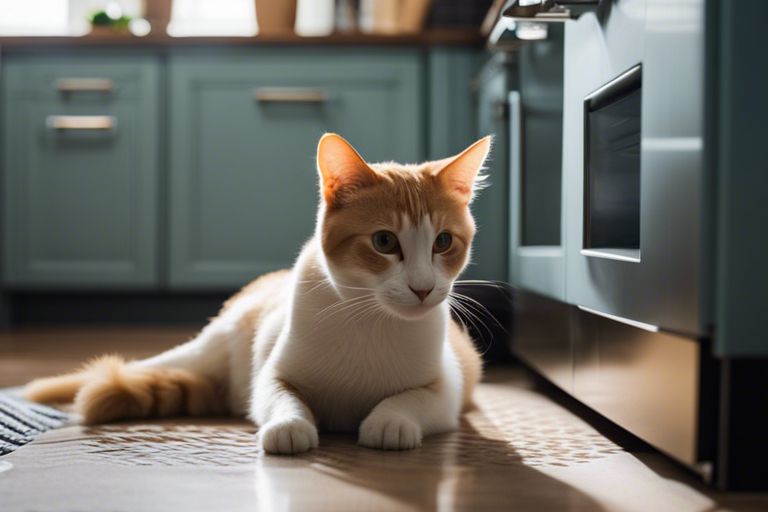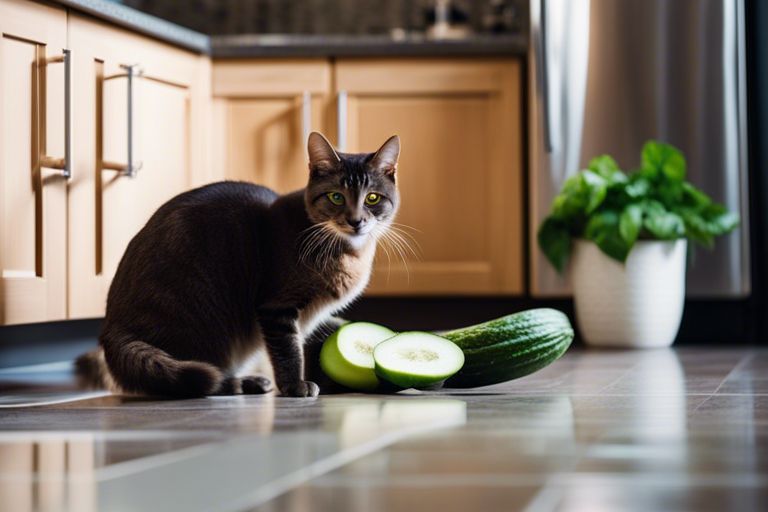Curious feline owners have often pondered whether or not cucumbers are a safe snack for their beloved pets. While cucumbers are generally safe for cats to consume, there are certain precautions and considerations to keep in mind. Cucumbers are rich in nutrients and low in calories, making them an attractive option for pet owners seeking to provide their cats with a healthy treat. However, it is important to be aware of potential choking hazards and digestive issues that could arise from feeding cucumbers to cats. It’s essential to approach this snack with caution and moderation to ensure the safety and well-being of our feline friends. Let’s delve into the details of whether cucumbers are a suitable addition to your cat’s diet.
Understanding Cats and Vegetables
Some people may wonder about the dietary habits of their feline companions, particularly when it comes to vegetables. Cats are obligate carnivores, which means their diet primarily consists of meat. However, some vegetables can also be beneficial for cats in moderation.
Nutritional Value of Vegetables for Cats
On the surface, it may seem that cats have no use for vegetables in their diet. However, certain vegetables can provide essential nutrients such as fiber, vitamins, and minerals that contribute to overall feline health. For example, leafy greens like spinach and kale are rich in vitamins A and K, which support various bodily functions in cats.
Common Misconceptions About Cats and Plant-Based Foods
To address common misconceptions, it’s important to note that while cats are primarily carnivorous, this does not mean they cannot consume plant-based foods. However, it’s crucial to ensure that the plants are safe for feline consumption and that they do not compromise a cat’s nutritional needs. Some owners may believe that all vegetables are harmful to cats, when in fact, some can be beneficial when properly introduced into their diet.
Cats should also not be fed a strictly vegetarian or vegan diet, as they require nutrients such as taurine and arachidonic acid that are primarily found in animal-based sources. Without these essential nutrients, cats can develop serious health issues.
Cats and Cucumbers: The Analysis
Now, let’s delve into the relationship between cats and cucumbers. Many cat owners wonder whether it’s safe to feed cucumbers to their feline friends. In this analysis, we’ll explore the safety of feeding cucumbers to cats, as well as any potential health benefits and risks.
Can Cats Eat Cucumbers Safely?
For many cats, cucumbers are safe to eat in moderation. They are non-toxic to cats and can even provide some hydration due to their high water content. However, it’s important to note that some cats may have digestive sensitivities to cucumbers, which can lead to gastrointestinal upset. Additionally, the skin of a cucumber can be difficult for some cats to digest, so it’s best to peel the cucumber before offering it to your feline companion.
Health Benefits and Risks
Health organizations generally agree that cucumbers can be a healthy addition to a cat’s diet. The high water content of cucumbers can contribute to a cat’s overall hydration, especially if they are not consuming enough water from their food. However, it’s important to keep in mind that too much cucumber can lead to an upset stomach, as well as potential issues with digestion and diarrhea.
A balanced approach to feeding cucumbers to your cat is key, ensuring that they receive the hydration benefits while minimizing the risks of digestive upset. As always, it’s best to consult with your veterinarian before making any significant changes to your cat’s diet.
Feeding Your Cat Cucumbers
Despite the common misconception that cats can only eat a diet of meat, cats can actually enjoy a variety of fruits and vegetables, including cucumbers. But before you start incorporating cucumbers into your cat’s diet, it’s important to consider their safety and nutritional benefits. For more detailed information on this topic, you can read the article Can Cats Eat Cucumber? Is Cucumber Safe For Cats?
How to Properly Introduce Cucumbers to Your Cat’s Diet
Cucumbers can be a healthy addition to your cat’s diet if introduced properly. Start by offering small, bite-sized pieces of cucumber to gauge your cat’s interest. It’s crucial to monitor their reaction and discontinue if any adverse effects are observed. Gradually increase the amount if your cat shows a positive reaction to cucumber, always consulting with your veterinarian before making any significant changes to their diet.
Recommended Portions and Frequency
To prevent any digestive issues, it’s important to limit the amount of cucumber your cat consumes. Too much cucumber can lead to stomach upset or diarrhea. Start with small portions, such as a thin slice or a small cube, and monitor your cat’s response. For instance, you can offer cucumber as an occasional treat, rather than a regular part of their diet, to ensure it does not cause any negative effects.
Remember, every cat is different, and what works for one may not work for another. It’s essential to consult with your veterinarian to determine the appropriate portion size and frequency for your individual cat.
For instance, if your cat shows a positive reaction to cucumber, you can offer it as an occasional treat, always keeping portion sizes small and closely monitoring their response.
Alternatives to Cucumbers and Other Safe Snacks
Keep your feline friend happy and healthy with a variety of safe snacks and treats. While cucumbers can be enjoyed in moderation, there are plenty of other options to consider for your cat’s snacking pleasure.
Safe Vegetables and Fruits for Cats
Any vegetables and fruits that are safe for cats to eat should be given in small, bite-sized pieces. Some safe choices include cooked carrots, steamed green beans, and small amounts of apple or pear. These options provide essential vitamins and minerals while also adding variety to your cat’s diet.
Foods to Avoid in a Cat’s Diet
Cats should never be given foods such as onions, garlic, grapes, or chocolate. These items can be extremely dangerous for cats and can cause severe illness or even death. Additionally, avoid giving your cat any processed human foods that may contain harmful additives or preservatives.
Cats are obligate carnivores and require a diet that is high in animal protein. Avoid feeding your cat foods that are high in carbohydrates or lack the necessary nutrients for their well-being. Always consult with your veterinarian if you have any questions or concerns about your cat’s dietary needs.
Is It Safe to Feed My Cats Foods That Are Not Typically Part of Their Diet?
It is crucial to consider cats consuming cocoa safety when deciding what to feed them. Many foods that are not typically part of their diet can be harmful, such as chocolate and cocoa products. Always stick to their regular diet to ensure their safety and well-being.
Conclusively, Cats and Cucumbers: A Safe Combination?
It is generally safe for cats to eat cucumbers in moderation, as they are non-toxic and can provide a hydrating and healthy snack. However, some cats may not enjoy the taste or texture of cucumbers, and excessive consumption can lead to digestive issues. It is important to always remove the skin and seeds, as these can be difficult for cats to digest. Overall, while cucumbers can be a safe and nutritious treat for cats, it is important to monitor their consumption and consult with a veterinarian if there are any concerns about their dietary habits.
Can Cats Eat Cucumbers? Is It Safe For My Cats?
Q: Can cats eat cucumbers?
A: Yes, cats can eat cucumbers. Cucumbers are non-toxic to cats and can serve as a healthy snack for your feline friend.
Q: Are there any potential risks for cats eating cucumbers?
A: While cucumbers are generally safe for cats, it’s important to monitor the amount consumed. Some cats may have digestive issues such as diarrhea or vomiting if they eat a large amount of cucumbers. Also, the peel of the cucumber can be difficult for cats to digest, so it’s best to remove it before offering it to your cat.
Q: How should I prepare cucumbers for my cat?
A: Before offering cucumbers to your cat, make sure to wash them thoroughly to remove any pesticides or harmful chemicals. It’s also recommended to cut the cucumber into small, bite-sized pieces to prevent choking and aid in digestion. Additionally, removing the peel before giving it to your cat can help prevent any potential digestive issues. Always monitor your cat’s reaction to new foods and consult with your veterinarian if you have any concerns.

Hello there, I am Iftekhar Ahmed. I am the owner of Mishka & The Cat Corners. I love to explore and write on various topics about cats




